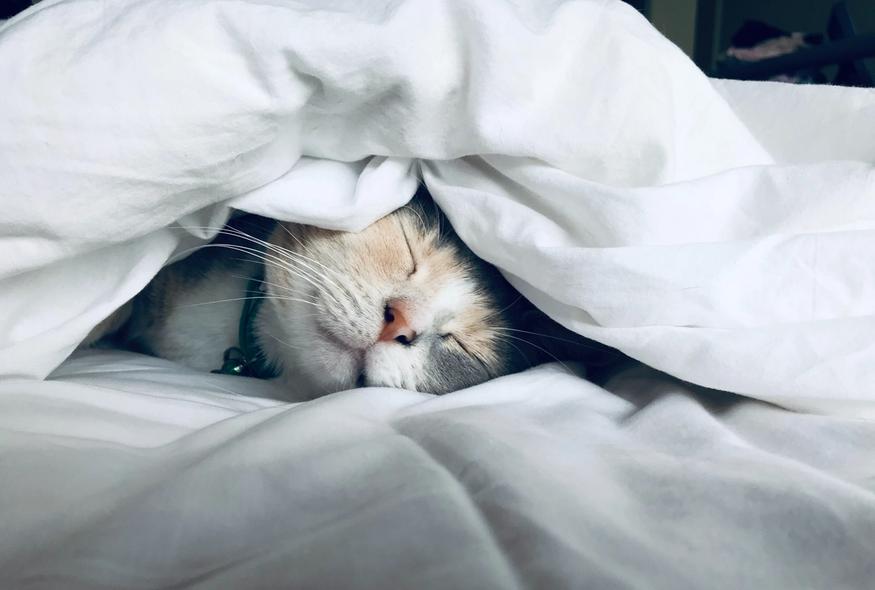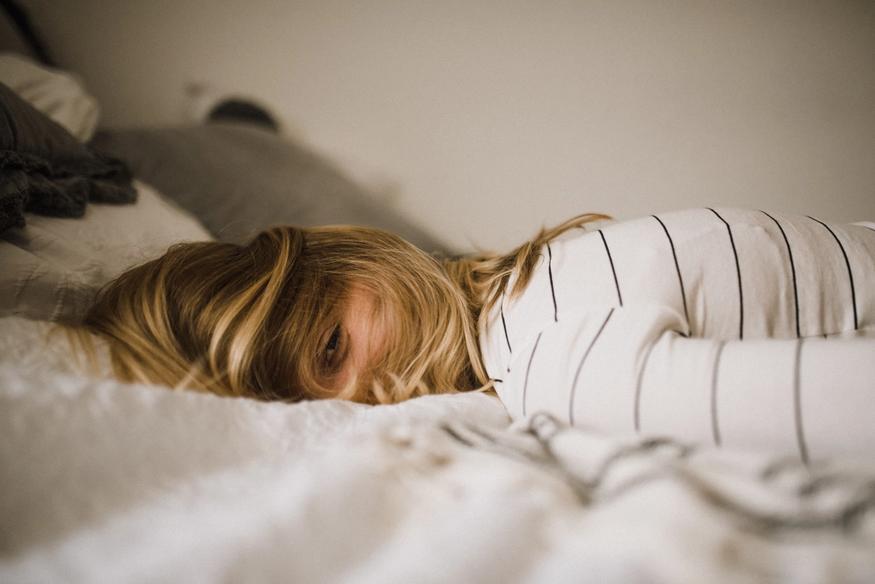Why I Prioritise My Sleep
Published on 8/16/2020I was recently listening to a podcast, and they said the following fact that really stuck with me.
You can’t make up for a bad night of sleep.
It took me a moment to comprehend it, and I’ll try to explain it as they did. So if you do an all-nighter or have a truly atrocious night of sleep, the damage of that is permanent. We like to think that we can make up for it by sleeping ten hours the next evening, but it isn’t true, it won’t undo what that awful night did. Sleeping poorly through the week can't be fixed by lie ins on the weekend. We will carry the damage, and hopefully over the long-term minimise it through good behaviours. We like to joke that we’ll sleep when we’re dead, or when we’re older at least. But by then, it is too late. The damage is done, you have set yourself too far back to ever catch up to the race.
As children we hated sleep, and tried everything to stay up late. Then as teenagers we adored sleep, and many had to be dragged out of their beds at noon. As adults, we’re back to hating sleep and avoiding it at all costs, with countless excuses and other things we could be doing. I think that’s why we disliked sleep as children, as we saw adults doing the same, we were mirroring their behaviour. Then as teenagers you rebel against these adult figures, and so we do the opposite of what they’re doing.
Sleep has a bad rep. We live in a culture of “hustling”, of working crazy hours and then topping it with a wild night out. We think this is truly living, but actually it is halting us from achieving our true potential.
Let’s look at how we’re damaging our wellbeing, emotional as well as physical, with a lack of sleep, and then I’ll take you through how I changed that, and began prioritising sleep as I would any other appointment.

The benefits of sleep
We all know that sleep is good for us. It’s no surprise that we’ve been hearing the importance of a good eight hours since we were little. But do you know the specific benefits of sleep? Once I actually sat down and looked into exactly what sleep does for me, it was harder to ignore it. The guilt over short nights lingered, and I felt more determined to make a change.
We all know that we feel worse after a bad night of sleep, we’re tired, irritable and struggle with concentration. You wake up ready to go back to sleep, or reaching for a large mug of sugar and caffeine. Here is why sleep is vital to your body and mind.
- Sleep gives your body the time it requires to rest, repair and rebuild. It soothes muscles and aches, and gives your limbs more energy the following day.
- It helps with weight control, as a lack of sleep disrupts the hormones that signal hunger and fullness in your body. Bad sleep will cause you to choose unhealthier foods and overeat. Being awake longer also means you require more energy and thus more sugary food.
- Heart health. A lack of sleep increases your chances of developing high blood pressure and coronary heart disease. It’s believed that waking up too often can stimulate your fight or flight response (sympathetic nervous system) causing your body to think it is in danger. If you’re awake too long, your body can’t compensate for the constant increases in blood pressure, so you’re at a higher risk for strokes and coronary heart disease.
- Poor sleep has been connected to poor insulin regulation and resistance. If you’re missing out on slumber, your body can’t regulate your blood sugar as well, so it increases and can cause diabetes.
- We’re here to make memories, and without sleep we struggle to do that. Sleep also repairs your mind, as it allows your brain to organise and process all the information that you received during the day. It converts all those short-term memories into long-term memories. This makes you learn more, and ensures all the knowledge is at your fingertips for when you wake up. Exam period? Sleep more!
- Sleep maximises our cognitive functioning, through attention span, strategic thinking, reaction time, concentration and risk assessment. Do you keep making bad choices? Maybe a few nights of good sleep will give you a hand.
Sleep and mental health
It isn’t just physical! A lack of sleep is a contributing factor to poor mental health. It’s a negative feedback cycle, as the more that you’re struggling and stressed, the worse you sleep. But the worse you sleep, the worse your mental health becomes. Stress can cause you to lie awake and have interrupted sleep, but poor sleep makes you struggle to handle your stress, as your body will continue to release stress hormones and not relax the systems involved. Too little sleep can result in mood swings and continued periods of a low mood. You’ll be more irritable and snap at the smallest of things. This grumpy mood impacts your social relationships, and will have you struggling to maintain good interpersonal relationships. Additionally, sleep impacts your communication skills, which is key in building new relationships and maintaining them.
Feeling like crap from a lack of sleep will make you feel rough all around, especially in terms of your mental health or mental illness.

How I prioritised my sleep again
I have never been one for all nighters as I'm too lazy, but I certainly didn’t give my sleep the importance that it deserved. I aimed for eight hours, but easily settled for less. I would stay up late drinking with friends and then skip a workout to ‘make up for it’. I’d sleep a maximum of 6 hours during the week, and then convince myself that sleeping ten hours on the weekend sorted it all out. I never felt at my best, I was always tired and grumpy. A large part of that was that I was already struggling with mental illness, as my depression leads me to be more fatigued and low. But I certainly wasn’t helping it. I was already a few steps behind due to my poor mental health, and a regular sleep schedule wouldn’t fix that or make me soar daily, but it could close the gap between me and others.
1. Learning
Educate yourself. My sister wrote a great article about waking up at 5.30am everyday, and it really shed some light on how to sleep better so that you can regain your mornings. I really recommend it. Aside from that, learn about yourself and your current sleep cycle. Can you even tell me how often you sleep on average, do you know?
2. My Fitbit
I was buying a new Fitbit, and so I chose one that measures sleep cycles. I considered it important to have a basic knowledge of my sleep cycle. It taught me many things. Firstly, even though I had my eyes closed in bed for eight hours until my alarm, that did not mean that I slept eight hours. I usually sleep about an hour less than I intend for. So to sleep eight hours, I needed to spend nine hours in bed without distractions. I also noticed that I wake up very often during the night, my sleep wasn’t deep enough which is why I struggled so much with memory and concentration. I tried to eliminate distractions and maximise my sleeping opportunity. I wore an eye mask as I’m sensitive to light and was struggling with sleep from five onwards.
3. In this together
I expressed my intentions to my boyfriend, who has a very different sleep schedule to me. He is such a night owl, whereas I’m useless once the sun sets. I like waking up early to workout and write, but right now I was struggling between our two routines. I got lucky, as he got a job that required him to get up early. So we tackled it together, making it a joint goal. We got ready for bed and then I read while he watched videos on his phone. Getting up together also motivated each other, it made it easier as we were in it together.
4. Reading and electronics
I’d love to say that I avoided electronics an hour before bed or longer, but I’m only human. However, I do stop myself from using them in bed. I never watch a series in bed anymore, as I know that my body will get confused when it comes to sleeping in bed and that it’ll be too easy to stay up late. So I watch episodes downstairs on the TV, and then in bed I only read. I have a book by my bed and every single night I read for a minimum of ten minutes. This helps me to achieve my own reading goals and to calm myself after the day. Even when I'm late to bed or have had a bit to drink, I make myself read, it is a non-negotiable part of my routine. Since introducing this habit, I fall asleep so much quicker, and I stay asleep. I literally could see the difference through my Fitbit sleep tracking. Read before bed, this is the easiest habit to pick up and makes such a difference.
5. No exceptions
It can be tempting to stay up later, to make plans on a weekday that I know will mess up my sleep schedule. But I can feel the effects the next day already, and it never feels worth it. So really aim to treat this as an appointment with yourself. This is something you can do for yourself every day, a kindness, so give yourself this gift.
6. Fill the mornings
Sleeping well doesn’t just mean sleeping as long as possible. It means recognising how much sleep your body and mind really need and doing that. I found that snoozing my alarm and sleeping longer in the morning actually makes me feel worse. This is related to sleep cycles, which I really recommend reading more about. So I try to book exercise classes for the first thing in the morning. This gets me out of bed and moving, and gives me such a kick for the rest of the day. I go to a 7am spin class or workout three times a week, and this means that by 8am I have already accomplished something, and so I’m hungry to do more and achieve more on that day. It doesn’t have to be a class, you could put your workout clothes ready and make yourself walk first thing that morning. Plan your morning hours and use them. It’s like this magical slot of time we thought we could never reach, that is suddenly open for use.
Why you should prioritise your sleep
We’ve talked about the physical and mental benefits, but a good sleep schedule is about more than science, it is about you. That includes your goals, feelings, emotions and more. Here is how sleeping more has helped me.
1. Routine
By choosing a set time to go to sleep and wake, I could build a whole routine to follow. I know when to start getting ready for bed and to then read in bed. I have the same alarm for each weekday morning. I know that in the morning I exercise and/or do some writing, with a bit of time for cleaning my kitchen as well. I know when I have time and when I can use it. Having a routine not only allows you to do more, but it can be extremely calming and nurturing. It takes a lot of the stress out of your day and allows you to achieve your goals quicker. By writing 1,000 words on my novel each morning, which took about an hour, I finally managed to take leaps towards my goal. And this happened in a time that I didn’t even think existed.
2. My best self
I am awesome on a good night of sleep. I am positive, motivated and ready to tackle my day. Giving myself eight hours of sleep is giving the gift of my best self. Not only to me, but to my friends and family. Sleep helps me to control the mood swings of my personality disorder, and it allows me to stay calm longer in anxious moments. I am someone who gets overwhelmed really quickly, and I know that poor sleep contributes to that feeling. Having more time in the mornings also allows me to take my day slower and enjoy it, and to have evenings off to myself.
3. The long-term
Good sleep feels like putting money away for the long-term. I’m not someone very focused on where I’ll be in ten or twenty years, I’m not really saving up or making plans to buy a house. But the exception is with my health. I make the efforts today to live a longer and healthier life. Maybe I’ll be broke when I’m old, but I’ll still be alive and kicking!
Aside from the long-term impact of my health, good sleep allows me to work on my long-term goals. I have more time and energy for my writing and freelance business, and wonderful mornings gifted to me.
4. Saying no
I suck at saying no to people. A lot of it stems from my BPD, but basically my intense fear of abandonment makes me fear upsetting people and losing them, and my inferiority complex makes me think I need to work twice as hard as the other person in the relationship. It really affects my life, as I end up agreeing to too many plans and taking the toll of it. But by making sleep a daily appointment I can’t be late too, I find it easier to say no each time. It’s great practice, and for some reason it feels easier to say no or adapt plans to ensure enough sleep, rather than because I want alone time or to work on my writing that weekend.
5. Good morning
I mentioned this before so I’ll keep it brief, but good sleep allows you to reclaim your morning. In time, as you get given this unused pocket of time where your sleep was probably poor anyways, and in energy. Many of us will wake up not too late, but we’ll be tired and slow, checking our phones and procrastinating. Nope, a good night of sleep plus a routine allows you to get up and seize the day. Think of all the things that you can do with that extra hour! Now do them!
6. Self-love
I haven’t always treated myself well, and it is something that I am still trying to learn to do. But respecting my sleeping hours is a big act of self-love. I am giving myself something that makes me feel good and operate at my best. I am giving myself alone time, to sit in bed with a book and not need twenty distractions. I am telling myself that sleep and my health is better than seeing someone else or watching a show. Relish in your nightly ritual once it is no longer rushed. And the same goes for your mornings, waking up on time with energy allows you to enjoy your morning. We often go to bed late and then put our alarm as late as we can manage. But then our morning is ruined by stress and haste. Get up a bit earlier and take your time. Do a nice hairstyle or fit in a walk with a podcast, sit down for breakfast or read a bit. Take a bath even! Your night and morning can be your own property, you don’t need to share them.

I can tell you all about this until I’m hoarse, but at the end of the day you are the one who needs to prioritise your sleep. There will be exceptions, nights worth spending out, there always are. But make a solid sleep cycle part of your weekly schedule, as sacred as your lunch break at work or workout class that you pay for. Give yourself this gift of sleep.
I promise that if you try this for even two weeks straight, you will already see a difference. Measure how you feel, check in with yourself and find what works for you. Everyone needs more or less sleep than others, it is so subjective. So I’m not telling you to sleep eight hours every single night, I’m saying that you need to work out how much sleep you need to be your best self.
Featured posts

Fleur
Welcome to Symptoms of Living! A place where I like to relieve myself of the barrage of thoughts and ideas filling my mind. Here I'll take a look at various topics, from books to BPD, series to self-harm, there's nothing that we can't, and shouldn't, talk about.
Having struggled with mental illness since the age of 15, one of the hardest parts was how alone I felt in it. While mental illness is beginning to be discussed more openly, and featured in the media, I still think there is room for improvement. So whether it is mental illness or merely mental health, a bad day or a bad year, let's make this a place to approach it and strip it back. Everyone has their own symptoms of living, and you certainly won't be the only one with it.
Would you like to receive my top monthly articles right to your inbox?
For any comments/questions/enquiries, please get in touch at:
info@byfleurine.com
I'd love to hear from you!